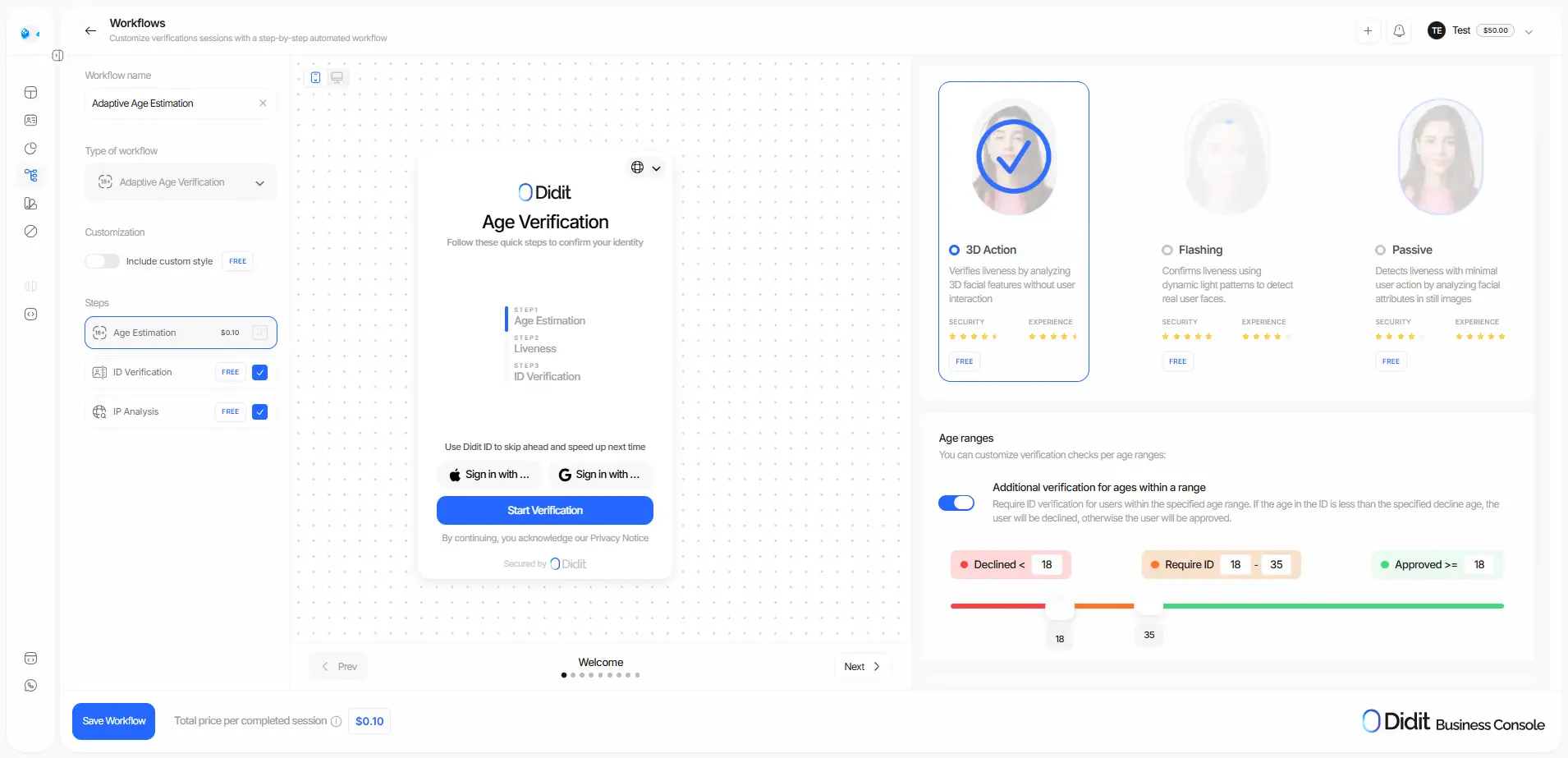
The 5 best age verification software providers in 2025
Key takeaways (TL;DR)
In 2025, age verification is a strategic lever that impacts conversion, costs, and regulatory exposure.
The best vendors blend biometric accuracy, anti-spoof liveness, and compliance without adding excessive friction.
Age estimation with a document fallback reduces abandonment and cost per approval.
Didit stands out with a modular approach, transparent pricing, and developer-friendly APIs.
Compliance, product, and growth teams live in constant tension around age verification: meeting frameworks like the EU’s DSA and the UK’s Online Safety Act without tanking onboarding conversion. Add new risk vectors (deepfakes, synthetic IDs, replay attacks) and real commercial pressure: every extra click drives more drop-off… and less revenue.
In 2025, age assurance is no longer a checkbox—it’s a strategic component that directly affects conversion, CAC, and regulatory risk.
In this guide we compare the 5 leading age-verification solutions and how to choose the right software for your industry, risk model, and privacy requirements. The key isn’t accuracy alone, but pairing it with UX and compliance in a flexible architecture that enables adaptive flows. That way you maximize approvals, cut costs, and keep regulators onside.
How to evaluate age verification software in 2025
Picking a provider isn’t just “who reads an ID best.” That matters, of course—but the focus should be designing the right journey for your risk and audience, with tech that adapts at every step.
- Accuracy vs. friction. Biometric age estimation delivers a rapid read from a real-time selfie—ideal for thresholds (e.g., ≥25 or ≥18) or sensitive funnels. Friction is near-zero when the tech is solid.
- Liveness & anti-fraud. Require robust (passive or active) liveness and defenses against spoofing, deepfakes, and replay. Prioritize vendors that combine biometric signals, manipulation detection, and cross-checks.
- Integration & control. Review docs, confirm public APIs and easy SDKs, plus embeddable components and no-code options to launch in minutes. Value webhooks and rules engines to orchestrate policies by country, age, and risk—without shipping code.
- Compliance. Your provider should help you meet the EU DSA, UK OSA, and privacy laws like GDPR and LGPD. Control data minimization and retention, and ensure tooling for DSRs (Data Subject Requests).
- Cost & ROI. Compare pricing models and model their impact on conversion and ops. Stepped flows (estimation → document fallback (ID + selfie + liveness)) typically improve cost per approval.
Age estimation: what it is, how it works, and when to use it
Age estimation verifies legal age with minimal friction using biometrics and AI. From a real-time selfie, the system estimates the user’s age and returns a confidence score. With configurable thresholds, you can approve, reject, or trigger a document fallback (ID + selfie + liveness) when uncertain. It’s designed for scenarios where the critical decision is whether the user is above or below X years with the least possible friction.
How age estimation works in a modern flow
- The user takes a real-time selfie.
- The system performs anti-fraud checks (liveness), runs age estimation, and returns a result.
- If the result clears the threshold, approve without asking for documents. If it lands in the gray zone, trigger a document fallback with 1:1 biometric verification.
This pattern speeds legitimate approvals, improves UX, and strengthens security where uncertainty exists.
Industries where age estimation shines
Some countries are considering moves to ban underage access to social media, including the UK, Australia, and EU members. Age estimation for ecommerce is especially relevant for platforms selling restricted products (alcohol, tobacco…), while age verification for iGaming (online gambling) is key for pre-verification requirements.
Countries like France and the United Kingdom are also pushing for highly effective solutions to protect minors.
Top 5 age-verification providers (2025 analysis)
Didit

Didit offers a modern, risk-adaptive solution: start with age estimation for fast decisions and, when uncertain, automatically escalate to a document fallback (ID + selfie + liveness) to stop fraud. The tech estimates age via biometrics and AI, applies liveness to block attacks (deepfakes or prerecorded video), and returns an estimate with confidence, enabling thresholds by country or sector.
Didit is built for product and compliance teams: public APIs, embeddable components, no-code options, and customizable rules to tune acceptance, SLAs, and drop-off by risk appetite. A transparent pre-paid credit model can save up to 70% vs. legacy vendors.
Jumio
Jumio is a well-known identity verification alternative that covers age-restricted sales and services. Its approach to confirming legal age is primarily document-based: reading a government ID, extracting date of birth, and running biometric checks to ensure the person matches the document. This pattern prioritizes strong assurances in regulated contexts and plugs into broader KYC flows when needed.
ID.me
ID.me offers age verification options that can work without submitting documents in certain scenarios by reconciling user-provided data with authorized sources. When required, the platform supports upload and review of government IDs. This flexibility lets teams match proof strength to service sensitivity and sector- or region-specific obligations.
Veriff
Veriff is an identity verification solution that leans on biometrics to verify age. With a selfie and passive liveness, it can check if a person meets the legal threshold and then request full document verification in edge cases or higher-risk scenarios. The stepped approach preserves conversion without sacrificing assurances when needed.
Onfido
Onfido is an identity verification platform that centers age verification on documents: validating a government ID, 1:1 biometric comparison (selfie), and liveness to confirm a real person is behind the camera. In standard flows, that means requesting a government ID to establish age with strong guarantees.
Disclaimer: Information was compiled from public sources and vendor websites. Products evolve; some details may change or become outdated.
The 5 best age verification software providers in 2025
